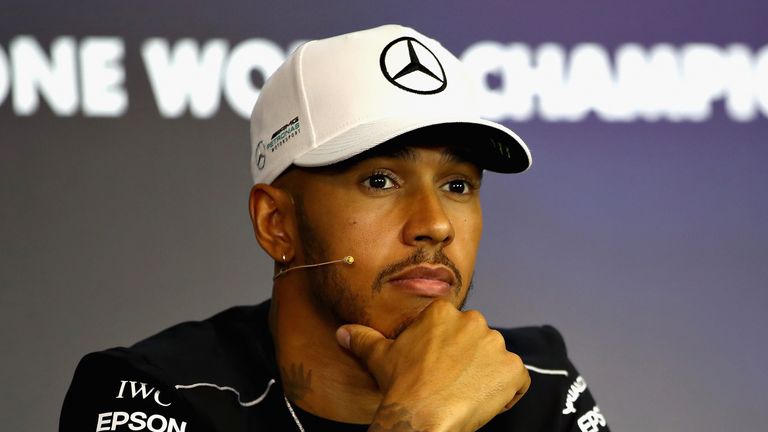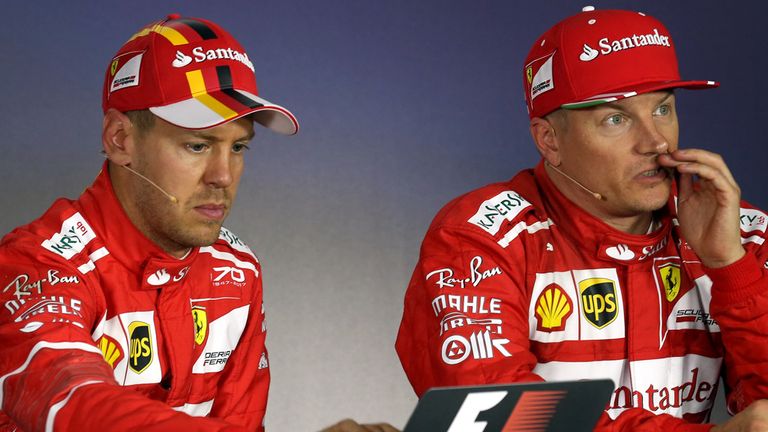Was Lewis Hamilton right or wrong to gift Valtteri Bottas third place?
Hamilton's third-place surrender in the Hungarian GP exposes contrast and conflict between Ferrari's politics and Mercedes' philosophy of equality
Monday 31 July 2017 14:59, UK
So should Lewis Hamilton have surrendered third place to Valtteri Bottas at the Hungarian GP?
Or to the put question another way, should Hamilton have put his title ambition over team ethos on Sunday afternoon?
True, Bottas had only pulled over for Hamilton to attack the Ferraris after the Englishman had said he would hand back the position if he couldn't get past Kimi Raikkonen.
But due to the broken radio which hampered Mercedes' race-day strategy, Bottas' inferior speed, and the close proximity of Max Verstappen on the final lap, Hamilton certainly wasn't short of excuses had he sought out some mitigating small print to avoid handing back the position.
To his credit, Hamilton didn't hesitate on the final lap to honour his pledge. But barely an hour after the chequered flag had fallen and the Mercedes driver appeared to be, if not quite having second thoughts about his generosity, in a quandary about his self-denial.
"The mind is more cut-throat and 'every point counts and this is do or die'. But my heart tells me the right thing to do is let him by," Hamilton admitted. "I want to win the championship the right way."
But doing the right thing may have consequences.
In giving up third position, Hamilton gave up three precious points in the title race and enabled Sebastian Vettel to depart Hungary with a 14-point lead over the summer break rather than what would have been 11.
Quite what impact Hamilton's sacrifice will have in the destination of this year's Drivers' Championship, only time will tell. When the season resumes at Spa next month, 225 points will still be on the table to play for. But in F1's 67-year history a world title has been decided by three points or fewer on 18 occasions.
Hamilton's gesture may prove irrelevant. Or it may prove very expensive.
Mercedes boss Toto Wolff got straight to the heart of the matter when he told Sky F1 immediately after the race: "We could lose a championship because of those three points."
But as Wolff then added: "This spirit has made us win three championships and it will make us win more."
As a debating point, Hamilton's surrender also had the added resonance - and conflict - of being performed on a day when Vettel benefited in reverse from a team-mate declining to challenge him.
While Ferrari remain F1's most political team, Mercedes have a philosophy of treating both drivers equally. So just as it is hugely unlikely that Vettel would have surrendered track position to Raikkonen had he found himself in the predicament presented to Hamilton on the final lap, Bottas surely would have challenged - and beaten - Hamilton for the lead of the race if Hamilton's car had developed the handling imbalance which crippled Vettel's for most of it.
As Vettel himself admitted on Sunday night: "Kimi had good pace and could go a lot faster than me for the majority of the race." Except, of course, that Ferrari wouldn't allow him to. Try as he might, and the Finn was certainly unusually communicative over team radio on Sunday, Raikkonen never had any realistic hope of persuading the Ferrari management to let him challenge the team's de facto number one.
All of which added an extra layer of moral and sporting ambiguity to Mercedes's dilemma and Hamilton's final-lap gift. It was certainly honourable. "I'm a man of my word," said Hamilton. But on a day when Vettel had in effect been gifted seven points by his team and his team-mate, was it sensible for Hamilton to then hand back a further three?
"When you are fighting another team for the world championship I think it's wise to have a nominated number one driver," opined Damon Hill. "Admirable by Mercedes and ultimately Hamilton to hand the place back to Bottas," tweeted Martin Brundle. "But with overall pace and Ferrari's tactics it made no sense."
Mercedes insist otherwise. "These are the values that helped us win six F1 Championships and, in the long term, will win us many more," argued Wolff.
Then there's the question of whether Bottas was really entitled to expect Hamilton to hand back third.
Hamilton had emerged from his pit stop on Lap 32 within a second of his team-mate. This in itself was far from ideal. But Mercedes and Hamilton also had another problem: a cracked fibre optic cable meant it wasn't until lap 44 before radio communications between Hamilton and the Silver Arrows pitwall was resumed.
Had Mercedes heeded Hamilton's insistence - immediately vindicated by his lap times when he was freed-up - that he could go much faster and immediately swapped their drivers after the pit-stops then the fresher tyre rubber could have made all the difference in Hamilton's quest to overtake Raikkonen. More plausibly, he could have made the race's finale much more uncomfortable for Ferrari than he eventually did. At the very least, the radio failure and wasted tyre life could have offered Mercedes an excuse, valid or otherwise, not to swap back their drivers on Lap 70.
Then there was the astonishing divergence in race speed between Bottas and Hamilton to consider.
Between Laps 41 and 45, the two Mercedes ran to near identical speeds in the low 1:22s. Hamilton was then freed up at the start of Lap 46…and instantly put in a 1:20.890 followed by a 1:21.189. Bottas lost a second giving up his position, setting a 1:24.403 on Lap 46, but then only recorded laps of 1:21.832 and 1:22.00 as Hamilton surged away.
Many would argue that, once it became clear Hamilton was unable to overtake the Ferraris, Bottas was only entitled to take back the position if he was still within range of Hamilton and the leaders. But entering the penultimate lap Bottas was still nearly eight seconds behind Hamilton with Max Verstappen - a genuine contender for victory, albeit only once Vettel's car had malfunctioned, but for his 10-second penalty for ramming into the side of his team-mate's car at the second corner - fast closing in.
Again, Mercedes had wriggle room. The risk of neither Mercedes car finishing third if Hamilton slowed down was considerable. But slow down he did - and by an astonishing margin. Having set a 1:20.818 on Lap 66, a 1:21.816 on Lap 67, a 1:20.932 on Lap 68, and a 1:21.460 on Lap 69, Hamilton had to slow to the near-crawl of a 1:30.120 on the final lap to engineer the swap. Was it possible to detect sheepishness from Bottas when he thanked his team-mate afterwards? Hamilton, it should be noted, crossed the line just four tenths of a second clear of Verstappen. His surrender wasn't merely a sacrifice but a risk too.
Ultimately, Formula 1 is a team sport. But when is a driver entitled to put his own title quest above team interests? As they embark on their summer holidays, that, surely, is the question both Wolff and Hamilton will be wrestling with for the next four weeks.
Don't miss the F1 Report on Wednesday at 8.30pm on Sky F1 as Formula 2 driver Jordan King and Marc Priestley join Natalie Pinkham to review the Hungarian GP.
If you are using skysports.com you can comment below to get involved in the debate, but please adhere to our House Rules. If you wish to report any comment, simply click on the down arrow next to the offending comment and click 'Report'.




